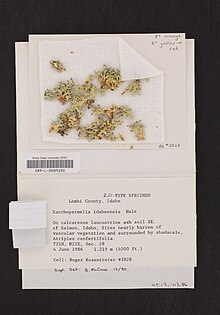Xanthoparmelia idahoensis is a lichen which belongs to the Xanthoparmelia genus.[3] The lichen is uncommon and is listed as endangered by the Nature Conservatory.[1]
| Xanthoparmelia idahoensis | |
|---|---|

| |
| Scientific classification | |
| Domain: | Eukaryota |
| Kingdom: | Fungi |
| Division: | Ascomycota |
| Class: | Lecanoromycetes |
| Order: | Lecanorales |
| Family: | Parmeliaceae |
| Genus: | Xanthoparmelia |
| Species: | X. idahoensis
|
| Binomial name | |
| Xanthoparmelia idahoensis | |
Description
editX. idahoensis grows in bunches and is found on soil. Its lobes are firm but can break apart when collected. Samples collected have been 2–4 cm in diameter with broad yellowish green lobes which are approximately 1.5-4 mm wide and are contorted or twisted. It has very spare simple rhizines on the underside that are 0.2-0.3mm long.[2]
Habitat and range
editX. idahoensis is found in the North American southwest including the US states of Idaho, Colorado, and Wyoming and the Canadian province of Saskatchewan.[1][4][5]
See also
editReferences
edit- ^ a b c "NatureServe Explorer - Xanthoparmelia idahoensis". NatureServe Explorer Xanthoparmelia idahoensis. NatureServe. 2022-10-07. Retrieved 7 October 2022.
- ^ a b Hale, Mason E. (1990). A synopsis of the lichen genus Xanthoparmelia (Vainio) Hale (Ascomycotina, Parmeliaceae) /. Washington, D.C.: Smithsonian Institution Press. doi:10.5962/bhl.title.123253.
- ^ St. Clair, Larry L.; Johansen, Jeffrey R.; Rushforth, Samuel R. (1993). "Lichens of Soil Crust Communities in the Intermountain Area of the Western United States". The Great Basin Naturalist. 53 (1): 5–12. ISSN 0017-3614. JSTOR 41712752.
- ^ Goffinet, Bernard; Rosentreter, Roger; Sérusiaux, Emmanuël (2001). "A second locality for Xanthoparmelia idahoensis Hale, an endangered vagrant lichen, new to Canada". Evansia. 18 (2): 58–59. doi:10.5962/p.346513. S2CID 130613095.
- ^ Diaz, Vanessa Marie. The Xanthoparmelia of Colorado: Diversity and Distributions. ISBN 978-1-369-17711-4. OCLC 972717191.
